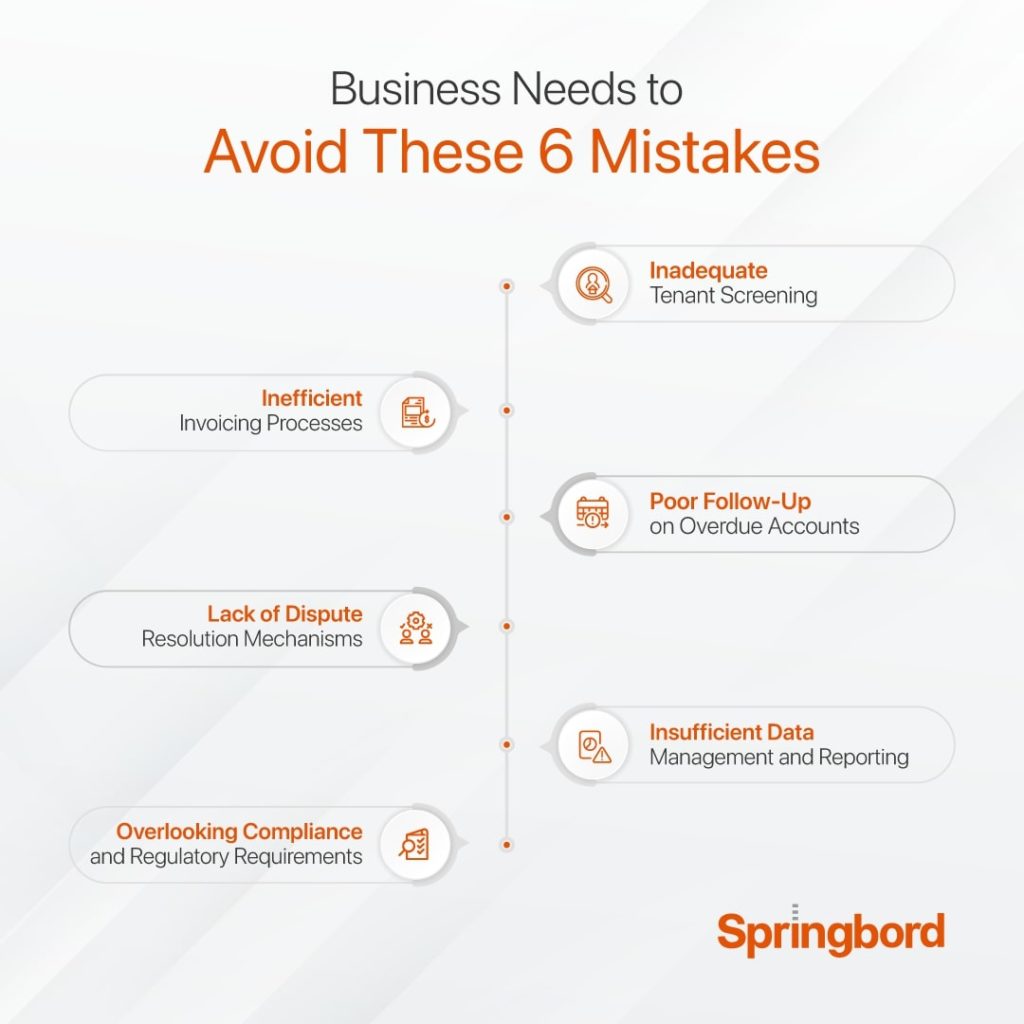 Read time 7 min
Read time 7 minEfficient accounts receivable (AR) management is crucial for the financial health of real estate businesses. Proper management of AR directly impacts cash flow, profitability, and the overall economic stability of a company.
This blog explores the significance of effective AR management. It highlights common mistakes to avoid, ensuring that business owners in the real estate sector can maintain robust financial practices and healthy relationships with tenants and stakeholders.
Importance of Efficient Accounts Receivable Management in Real Estate
Impact on Cash Flow and Profitability
Efficient AR management is fundamental to maintaining a steady cash flow, which is the lifeblood of any business. For real estate firms, the timely collection of receivables ensures sufficient funds to cover operational expenses, invest in property improvements, and seize new investment opportunities.
According to a survey, businesses that actively manage their AR can reduce the average collection period significantly, enhancing liquidity and enabling better financial planning.
Role in Maintaining Healthy Financial Relationships with Tenants and Stakeholders
Effective AR management also plays a crucial role in fostering positive relationships with tenants and stakeholders. Clear communication and prompt invoicing not only improve the likelihood of on-time payments but also build trust and transparency.
According to Versapay, 35% of businesses identified communication challenges as a significant barrier to timely collections. By implementing effective communication strategies and utilizing technology to track interactions, real estate firms can minimize disputes and ensure smoother transactions.

Businesses can stay clear of common pitfalls and guarantee a consistent cash flow by emphasizing clear communication, optimizing AR processes, and utilizing technology. Springbord excels at providing tailored AR management solutions, helping real estate companies streamline their processes and achieve financial success.
Mistake 1: Inadequate Tenant Screening
Inadequate tenant screening can lead to chronic late payments and defaults.
Poor credit checks fail to reveal essential financial and behavioral patterns, increasing the risk of renting to unreliable tenants.
Consequences of Poor Tenant Credit Checks:
Chronic Late Payments and Defaults: Without thorough credit checks, property managers may rent to tenants with a history of late payments or defaults, disrupting financial stability.
Increased Risk of Eviction: Tenants with poor credit histories are more likely to face financial difficulties, leading to costly and time-consuming evictions.
Property Damage and Maintenance Issues: Tenants with questionable financial histories may exhibit poor maintenance habits, leading to increased property damage and higher maintenance costs.
Pro-Level Solutions:
- Implement Comprehensive Credit and Background Checks: Conduct detailed credit and background checks, including criminal records and eviction histories, to assess tenant reliability and financial responsibility.
- Use Predictive Analytics Tools for Tenant Risk Assessment: Leverage predictive analytics to identify potential risks by analyzing vast amounts of data and predicting a tenant’s likelihood of fulfilling lease obligations.
Springbord offers advanced tenant screening services, including comprehensive credit checks, background investigations, and predictive analytics, to help you select reliable tenants.
Partner with Springbord to mitigate risks and maintain a profitable property portfolio.
Mistake 2: Inefficient Invoicing Processes
Inefficient invoicing can significantly impact financial health. Common issues include delays and errors in manual invoicing and a lack of standardized procedures.

Delays and Errors in Manual Invoicing: Manual invoicing is time-consuming and error-prone, with costs ranging from $15 to $30 per invoice and processing times of up to 21 days. Errors such as duplicate payments and missed invoices lead to financial discrepancies.
Lack of Standardized Invoicing Procedures: Without standardized procedures, invoicing becomes chaotic, causing delays and confusion, and making it difficult to track payments and manage records.
Pro-Level Solutions:
- Automate Invoicing with Property Management Software: Automation reduces errors and increases efficiency by automating invoice generation, distribution, and payment tracking.
- Implement Electronic Invoicing (E-Invoicing) Systems: E-invoicing eliminates paper-based invoices, reducing processing times and errors while enhancing transparency and real-time tracking.
- Use Blockchain for Secure and Transparent Invoicing: Blockchain ensures the immutability and authenticity of invoices, preventing fraud and reducing disputes.
Springbord specializes in advanced invoicing solutions tailored to the real estate industry.
Our automation and technology integration expertise helps streamline invoicing processes, reduce operational costs, and enhance financial accuracy.
Mistake 3: Poor Follow-Up on Overdue Accounts
Poor follow-up on overdue accounts can lead to significant financial challenges. Delayed collections impact cash flow and strain tenant relationships.
Impact of Delayed Collections on Cash Flow: Delayed collections disrupt cash flow, essential for operational expenses and financial stability. Companies with poor collection processes can lose up to $4.5 million monthly.
Strain on Tenant Relationships and Increased Risk of Write-Offs: Inefficient follow-ups strain tenant relationships, leading to frustration and disputes. Delayed collections also increase the risk of write-offs.
Pro-Level Solutions:
- Establish Automated Follow-Up Reminders and Schedules: Automated systems improve collection efficiency by sending consistent reminders and follow-ups.
- Integrate AI-Driven Collection Systems for Timely Follow-Ups: AI systems predict the best times to contact tenants, identify payment patterns, and automate follow-ups.
- Outsource to Professional Collection Agencies for High-Risk Accounts: Outsourcing to specialized agencies improves recovery rates and reduces the burden on in-house staff.
Springbord offers comprehensive services to improve receivables management for real estate firms. Using modern technologies and proven strategies, Springbord ensures timely collections, reduces write-offs, and enhances cash flow stability.
Mistake 4: Lack of Dispute Resolution Mechanisms
A lack of dispute resolution mechanisms can cause financial and relational issues. These conflicts can significantly impact financial reconciliation and tenant relations if they are not managed properly.

Common Reasons for Payment Disputes in Real Estate
- Breach of Contract: This occurs when one party fails to fulfil their contractual obligations, such as payment terms, delivery of clear title, or completion of agreed-upon repairs.
- Undisclosed Defects: Sellers failing to disclose known defects can lead to disputes when buyers discover these issues post-transaction.
- Repair Concerns: When the seller promises repairs, but they are not performed adequately or at all, disputes frequently occur.
- Boundary Disputes: These conflicts centre on the precise boundaries of a property and can be made worse by encroachments or improperly drafted title documents.
Pro-Level Solutions
- Develop Clear Dispute Resolution Policies and Procedures: Establishing clear policies helps prevent and manage disputes effectively.
- Use Mediation and Arbitration for Resolving Disputes: Mediation and arbitration are effective alternatives to court for settling disputes. Mediation involves an impartial third party helping both sides reach an agreement, while arbitration has a neutral arbiter making a binding decision. These methods are faster, less costly, and help maintain professional relationships.
- Implement a Tenant Portal for Transparent Communication and Dispute Tracking: A tenant portal enhances transparency and efficiency in managing disputes.
At Springbord, we develop dispute-resolution mechanisms that enhance tenant relations and streamline financial processes. Our services include policy development, mediation, arbitration support, and tenant portals for transparent communication.
Mistake 5: Insufficient Data Management and Reporting
Accurate data management and reporting are crucial for informed decision-making. Many businesses struggle with data accuracy and accessibility, leading to challenges in generating comprehensive financial reports.
Issues with Data Accuracy and Accessibility: Manual data entry is prone to errors, leading to inaccuracies in tenant information, lease details, and financial transactions. Data silos from multiple software platforms result in fragmented data, hindering decision-making.
Challenges in Generating Comprehensive Financial Reports: Fragmented data makes it difficult to produce comprehensive reports, leading to incomplete or delayed financial information.
Pro-Level Solutions:
- Implement Robust Real Estate Accounting Software: Integrate various functions into a single platform to ensure data consistency and accuracy.
- Use Data Analytics for Real-Time Reporting and Insights: Data analytics tools provide real-time insights and identify trends for proactive decision-making.
- Conduct Regular Audits and Reconciliations: Regular checks maintain data accuracy and support better financial planning.
Partnering with Springbord enhances data management practices, leading to more accurate financial reporting and informed decision-making.
Mistake 6: Overlooking Compliance and Regulatory Requirements
Compliance with regulatory requirements is crucial in the real estate industry. Failing to adhere to these regulations can lead to significant legal risks, financial penalties, and reputational damage.

Legal Risks Associated with Non-Compliance: Non-compliance with real estate laws can result in severe legal consequences. Regulatory authorities can impose hefty fines, penalties, and even revoke business licenses.
Penalties and Fines Impacting Financial Health: Fines for regulatory breaches can run into millions of dollars, significantly affecting a company’s bottom line. The costs associated with legal defenses, settlements, and corrective measures add to the financial burden.
Pro-Level Solutions
- Stay Updated with Local, State, and Federal Regulations: Real estate firms should stay informed about regulatory changes by subscribing to industry updates, joining professional associations, and participating in training programs.
- Use Compliance Management Software: Implementing compliance management software can streamline adherence to regulatory requirements. These solutions automate compliance checks, track regulatory changes, and ensure accurate documentation, reducing the risk of human error.
- Regular Training for Staff on Compliance: Requirements Regular training sessions on regulatory requirements, ethical standards, and compliance procedures help ensure that everyone understands their responsibilities.
At Springbord, our services help firms stay updated with regulatory changes, implement effective compliance strategies, and conduct regular training programs. Partnering with Springbord helps mitigate legal risks, avoid financial penalties, and ensure your business operates within the law.
Conclusion
Efficient accounts receivable management is essential for maintaining the financial health and operational stability of real estate businesses. By avoiding the given common mistakes, real estate firms can enhance their financial practices and ensure smoother operations.
Boost your real estate business’s success by choosing Springbord for outsourcing your accounts receivables.
Our specialized expertise ensures robust financial health and operational efficiency through comprehensive solutions. Contact Springbord today to optimize your accounts receivable management and drive your business to new heights.







